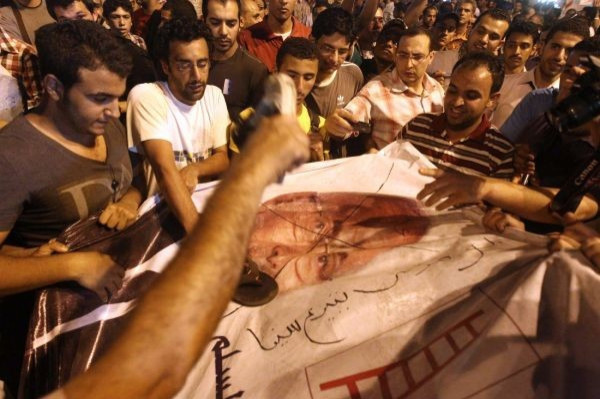Egypt Election Chaos: What Does The Fire At Shafiq's HQ Mean?

Late on Monday, a group of protesters ransacked and set fire to the headquarters of Egyptian presidential candidate Ahmed Shafiq as several thousand more demonstrators took to the streets across the country to rally against the pro-military candidate.
Shafiq, an ex-air force commander and the last prime minister under deposed president Hosni Mubarak, took second place in Egypt's presidential elections last week, and will face off against the leading vote-getter Mohamed Mursi, a senior member of the Muslim Brotherhood, in a run-off election next month.
The fire in Cairo's Dokki district is a symptom of the polarizing effect the final two candidates are having on Egypt's body politic. Each represents an opposite end of the spectrum -- Shafiq is seen as a relic of the old regime with worrisome military connections, while a Mursi victory would mean that the Islamist-dominated Brotherhood would control the presidency, both houses of parliament and likely the constitutional committee.
The revolutionary forces do not trust Ahmed Shafiq. There is this saying in Egypt: We don't trust the brothers, but we have blood with Ahmed Shafiq, Omar Ashour, head of the Middle East program at the Institute of Islamic Studies at the University of Exeter, told Australia's ABC news.
While a slim majority of voters -- about 16 million of them -- picked so-called revolutionary candidates, their votes were split among more than half a dozen other candidates, giving Mursi and Shafiq the lead and creating what Reuters described as nightmare for revolutionaries and an agonizing choice for a sizable portion of the electorate.
People are shocked because to them, Shafiq's victory is like President Hosni Mubarak coming back to power, or one of Qaddafi's sons taking the reins in Libya, or the Syrian freedom fighters accepting the selection of Mahir al-Assad to replace his brother Bashar, explained Abdul Rahman al-Rashed, the general manager of Al Arabiya News.
The outpouring of anger was not isolated to the Monday's inferno. Last Wednesday, on the second day of voting, protesters threw shoes and stones at Shafiq as he made his way into a Cairo polling station. Demonstrators, many of them holding pictures of family members killed by government thugs in Tahrir last year, chanted down with the regime and the coward is here ... the criminal is here as armed bodyguards escorted Shafiq in and out of the building.
You killed the martyrs. Their blood is on your hands. We either get their rights or die like them, the protesters chanted. We don't want you here.
These incidents raise a serious question: What will happen if Shafiq wins the run-off election? Late in his campaign, Shafiq infamously said through a spokesperson that the revolution is over, but if he takes command of Egypt, will he have a new revolution on his hands?
© Copyright IBTimes 2025. All rights reserved.





















